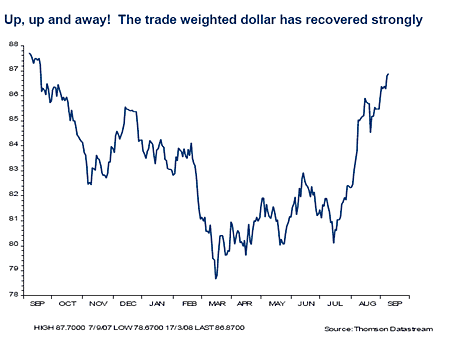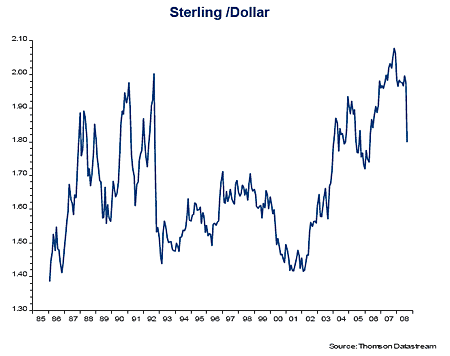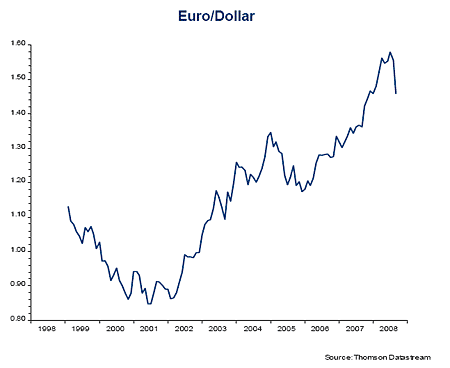Should you put your money in the US?
The US economy has proved more resilient than many had thought. The dollar is on a remarkable rebound. And many investors are switching from blue-chips in the UK to their equivalents in the US. But is this the sensible thing to do?
Get the latest financial news, insights and expert analysis from our award-winning MoneyWeek team, to help you understand what really matters when it comes to your finances.
You are now subscribed
Your newsletter sign-up was successful
Want to add more newsletters?

Twice daily
MoneyWeek
Get the latest financial news, insights and expert analysis from our award-winning MoneyWeek team, to help you understand what really matters when it comes to your finances.

Four times a week
Look After My Bills
Sign up to our free money-saving newsletter, filled with the latest news and expert advice to help you find the best tips and deals for managing your bills. Start saving today!
If one must cross the blasted heath then take a tip from the writer of this note and be careful about doing it on horseback! Global financial markets have been crossing the blasted heath all summer and have now been in a state of severe flux for more than twelve months. The placement of Fannie Mae and Freddie Mac into 'conservatorship' represents only the latest effort on the part of Western authorities to get on top of a situation that still gives the strong impression of running out of control. This note is, however, not about US government sponsored enterprises but on the more optimistic subject of the dollar's revival and the prospect for earnings upgrades for those internationally focused businesses which derive a significant proportion of their revenues in dollars.

The dollar's revival over the summer has been spectacular. The currency has rallied by c11% on a trade weighted basis since July, a move which, in our view, goes well beyond that which would be expected simply on the basis of relative interest rate differentials. Given that the US economy has proved more resilient than many, including ourselves, had thought likely over Q2 2008 a period of relative dollar strength was to be expected. But just as the dollar has strengthened so the euro and particularly, sterling, have depreciated as the economic and earnings outlook on this side of the Atlantic has deteriorated.
Perhaps the key question for long-term investors to address is whether the dollar can maintain its strength on the foreign exchanges when US economic activity wanes, as we are sure it will once the transient impact of tax rebates and a positive contribution from net trade wears off? To answer that question directly we take the view that the dollar has turned a corner and that its relative strength over the summer will not prove transient. The reason for this is that although US output growth will slow (and possibly take the economy back towards recessionary conditions) the European and, particularly the UK economies, will be performing even worse by the last few months of this year.
MoneyWeek
Subscribe to MoneyWeek today and get your first six magazine issues absolutely FREE

Sign up to Money Morning
Don't miss the latest investment and personal finances news, market analysis, plus money-saving tips with our free twice-daily newsletter
Don't miss the latest investment and personal finances news, market analysis, plus money-saving tips with our free twice-daily newsletter
According to our technical analyst, Bill McNamara, since 1982 cable has oscillated around $1.50-1.65 and that mean reversion could well see a return to these levels over the medium term (next 12-months). On a near-term view we see a move to $1.70 as entirely possible before the end of the year. Against the euro a similar mean reversion would see a return to c$1.15-1.35 with a near-term retreat to around $1.22. Once these moves have been made, implying a likely 50% retracement of earlier weakness, a period of consolidation may follow.


Although relative economic growth rates are part of the story behind the dollar's revival, they are not the only reasons. It should be noted that over the past five to ten years growth was entirely a reflection of the inflating credit bubble. When, in 2003, the Federal Reserve drove US base rates to just 1.0%, this artificially low level triggered a gigantic and equally abnormal capital spending boom. At the time this was regarded as necessary in order to create sufficient demand in the West to soak up additional supply emanating from the rapidly growing China and other Asian countries. As a direct consequence the global economy became more integrated than at any time in the history of the world. As such, is it too far fetched to wonder whether emerging markets, far from decoupling with the world's largest economy, are actually more closely linked than ever? Emerging markets are more closely linked than ever but are, inevitably, regarded still as much more cyclical. The impact of the credit boom of the early 'naughties' was aggressively to enhance that cyclicality. The weakness of global equity markets over the past year could be regarded as the inevitable precursor to a period of increased global cyclicality.
As a consequence of the above we find it easy to understand why global investors have been using the dollar's new found strength against a broad range of currencies (not just sterling where the extent of the move has been admittedly greatest) as the justification for exiting commodities and emerging markets and focusing instead on the US Treasury and equity markets. This also goes a long way towards explaining some of the recent weakness in the UK equity market. Investors have been switching out of those UK 'blue chip' companies and into the equivalent in the United States, especially in those sectors where US companies are regarded as deriving a greater proportion of revenues from 'home' markets (i.e. not regarded as being severely impacted by adverse translation or slowing growth elsewhere). This is particularly true of the Healthcare and Food Producer sectors.
One final word. US politics may be playing a part in this too. The Presidential election race is hotting up in the wake of recent party conventions. At present the ultimate winner of the early November poll is too close to call, however, one thing is certain; the next administration is unlikely to be as fiscally reckless as the present. Back in 1992 the dollar troughed shortly before the election that year and recovered strongly in anticipation of a new administration, irrespective of whether that administration was of Republican or Democratic hue, on the basis that the promise of fiscal discipline would be upheld. We strongly expect the same to be happening this time around.
This article first appeared in 'Week in Preview', published by Charles Stanley stockbrokers.
Get the latest financial news, insights and expert analysis from our award-winning MoneyWeek team, to help you understand what really matters when it comes to your finances.
MoneyWeek is written by a team of experienced and award-winning journalists, plus expert columnists. As well as daily digital news and features, MoneyWeek also publishes a weekly magazine, covering investing and personal finance. From share tips, pensions, gold to practical investment tips - we provide a round-up to help you make money and keep it.
-
 Can mining stocks deliver golden gains?
Can mining stocks deliver golden gains?With gold and silver prices having outperformed the stock markets last year, mining stocks can be an effective, if volatile, means of gaining exposure
-
 8 ways the ‘sandwich generation’ can protect wealth
8 ways the ‘sandwich generation’ can protect wealthPeople squeezed between caring for ageing parents and adult children or younger grandchildren – known as the ‘sandwich generation’ – are at risk of neglecting their own financial planning. Here’s how to protect yourself and your loved ones’ wealth.

